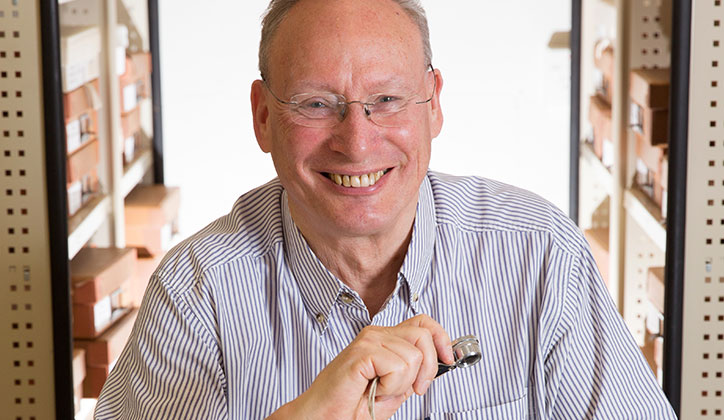Join us in congratulating Professor Mark Westoby on being named Scientist of the Year at the 2014 NSW Science and Engineering Awards.
“Professor Westoby is a driven and valued member of our academic community,” said Deputy Vice-Chancellor (Research) Professor Sakkie Pretorius. “As an ARC Laureate Fellow, Distinguished Professor of Biology and leader of the Genes to Geoscience Research Centre, Mark is a pioneer in his field.”
Professor Westoby works in the Department of Biological Sciences and first joined Macquarie in 1975. Highlights of his distinguished career include:
- The development of a state-and-transition approach to managing ecosystem change, now mandatory throughout rangelands in the USA
- The leadership of large-scale ecological dataset compilations, whereby patterns that were previously local and from smaller-scale studies have been quantified and consistency-tested at world scale.
- The 2003 Ecological Society of Australia Gold Medal for research and postgraduate leadership
- The 2005 Clarke Medal from the Royal Society of NSW for distinguished research in the natural sciences
- Being elected to fellowship of the Australian Academy of Science in 2009
- Being awarded the Australian Laureate Fellowship in 2010.
The Patron of the Awards, NSW Governor His Excellency General The Honourable David Hurley AC DSC (Ret’d), presented Professor Westoby his trophy during the gala ceremony at Government House. Professor Westoby was also awarded $55,000 in prize money.
We asked Professor Westoby a number of questions about his academic background, why he came to Macquarie and the challenges that lie ahead in his field.
What’s the elevator pitch/layman’s version of your academic background and expertise?
My area of expertise is in ecology and evolution, mainly plants.
Why did you choose that discipline?
I chose ecology and evolution for the intellectual challenge, and plants because for ecosystems on land, they are the single most important component.
What attracted you to Macquarie?
My PhD had not gone well. During my postdoc years I applied for jobs in lots of places. I was very lucky to get picked up by Macquarie’s biology department.
It’s a friendly, supportive and talented department. Over the past four decades we have built Macquarie’s research reputation on the world scene, and survived a variety of administrations along the way.
What do you see as the opportunities and challenges ahead in your field of research?
For sure the biggest research opportunity is human-induced climate change. Mostly in ecology and evolution we don’t get to make experimental changes to ecosystems, at least not on a large scale. But here we have a situation where humanity is spending enormous resources and burning enormous amounts of fossil fuel to drive accelerating climate change. For ecological research, climate change will be like the large hadron collider for particle physics – the components of ecosystems will be moved to and fro at unprecedented speeds, and the outcomes from that should give us strong experimental tests for competing ideas about how ecosystems work.
Sadly it’s also the case that climate change will destroy a large fraction of the planet’s biological heritage over the next century or two. But the science community has been warning about this loud and clear for more than 30 years. Despite clear and forceful advice from tens of thousands of scientists, all the data show humanity continuing to pursue population growth and economic consumption. We’re steering a steady course toward a much depleted world.

